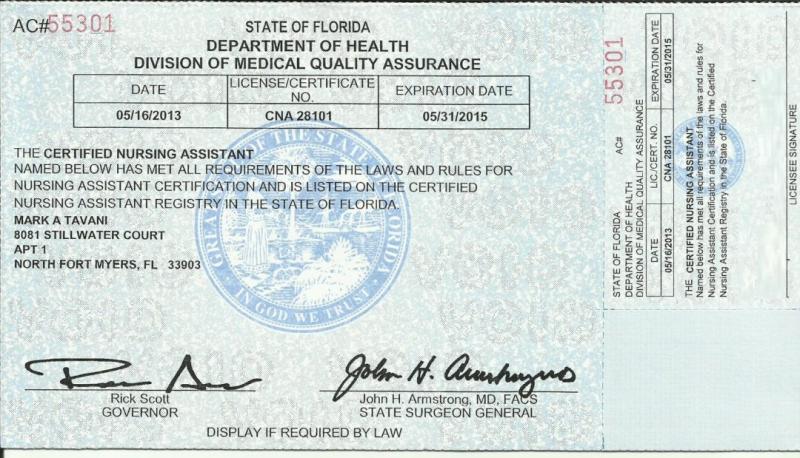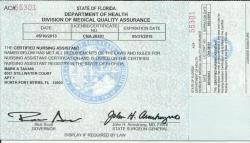What is CNA license?
A CNA license, or Certified Nursing Assistant license, is a credential obtained by individuals who have completed the necessary training and met the requirements to work as certified nursing assistants in the healthcare field. Certified Nursing Assistants, also known as Nursing Aides or Patient Care Assistants, provide direct care and support to patients under the supervision of licensed nurses, typically in hospitals, nursing homes, or other healthcare facilities.
Here is an overview of the process to obtain and maintain a CNA license:
1. Education and Training:
- Individuals interested in becoming CNAs must complete a state-approved training program. These programs are often offered by community colleges, vocational schools, or healthcare facilities. Training typically includes both classroom instruction and hands-on clinical experience.
2. State Certification Exam:
- After completing the training program, aspiring CNAs must pass a state certification exam. The exam typically consists of a written or oral portion and a skills demonstration. The content of the exam covers the knowledge and skills necessary for providing safe and effective patient care.
3. Background Check:
- Many states require CNAs to undergo a criminal background check as part of the certification process. Individuals with certain criminal convictions may be ineligible for CNA certification.
4. Certification by the State Nursing Board:
- Once an individual has successfully completed the training program and passed the certification exam, they can apply for CNA certification through the state's nursing board or a relevant regulatory agency. The specific name of the agency may vary by state.
5. License Renewal:
- CNA licenses are typically valid for a specific period, often two years. To maintain an active license, CNAs must renew it by fulfilling renewal requirements, which may include continuing education hours and, in some cases, a demonstration of ongoing competency.
6. Continuing Education:
- Some states require CNAs to complete continuing education credits to stay abreast of changes in healthcare practices and maintain their skills. Continuing education helps ensure that CNAs provide quality care to patients.
7. Scope of Practice:
- CNAs must work within their state's scope of practice regulations, which define the tasks and responsibilities they are allowed to perform. The scope of practice varies by state, and CNAs should be aware of and adhere to these regulations.
A CNA license is essential for individuals seeking employment in the healthcare industry as nursing assistants. It serves as evidence that the individual has received the necessary training, demonstrated competence through examination, and is authorized to provide direct patient care under the supervision of a licensed nurse. The specific requirements for obtaining and maintaining a CNA license may vary by state, so individuals should check with their state's nursing board or regulatory agency for accurate and up-to-date information.
What does a CNA license entail?
A Certified Nursing Assistant (CNA) license allows individuals to work as entry-level healthcare professionals, providing direct patient care under the supervision of registered nurses (RNs) or licensed practical nurses (LPNs).
Here's a breakdown of what a CNA license entails:
Requirements:
- Completion of an approved CNA training program: This program typically covers topics such as anatomy, physiology, basic nursing skills, infection control, communication, and patient care.
- Passing the National Nurse Aide Assessment Program (NNAAP) exam: This two-part exam tests knowledge and skills in both written and practical components.
- Meeting state-specific requirements: Additional requirements may vary depending on the state, such as background checks, health screenings, and immunizations.
Responsibilities:
- Providing basic patient care, such as:
- Assisting with eating, dressing, and bathing
- Taking vital signs
- Measuring and recording intake and output
- Assisting with ambulation and transfers
- Providing emotional support and companionship
- Maintaining a clean and safe environment for patients
- Communicating effectively with patients, nurses, and other healthcare professionals
- Documenting patient care activities accurately
Benefits:
- Relatively short training program compared to other healthcare professions
- In-demand job with high job growth potential
- Opportunities for advancement in the healthcare field
- Personal satisfaction from providing care and making a difference in people's lives
Resources:
- National Council of State Boards of Nursing (NCSBN): https://www.ncsbn.org/
- National Association of Health Care Assistants (NAHCA): https://www.nahcacna.org/
- State Board of Nursing websites
Additional Points:
- CNA licenses typically need to be renewed every two years, requiring continuing education credits.
- Salaries for CNAs vary depending on location, experience, and employer.
- CNAs can work in various settings, such as hospitals, nursing homes, home healthcare agencies, and assisted living facilities.
Overall, obtaining a CNA license can be a rewarding career choice for individuals who are compassionate, patient, and detail-oriented, and who want to make a positive impact on the lives of others.



